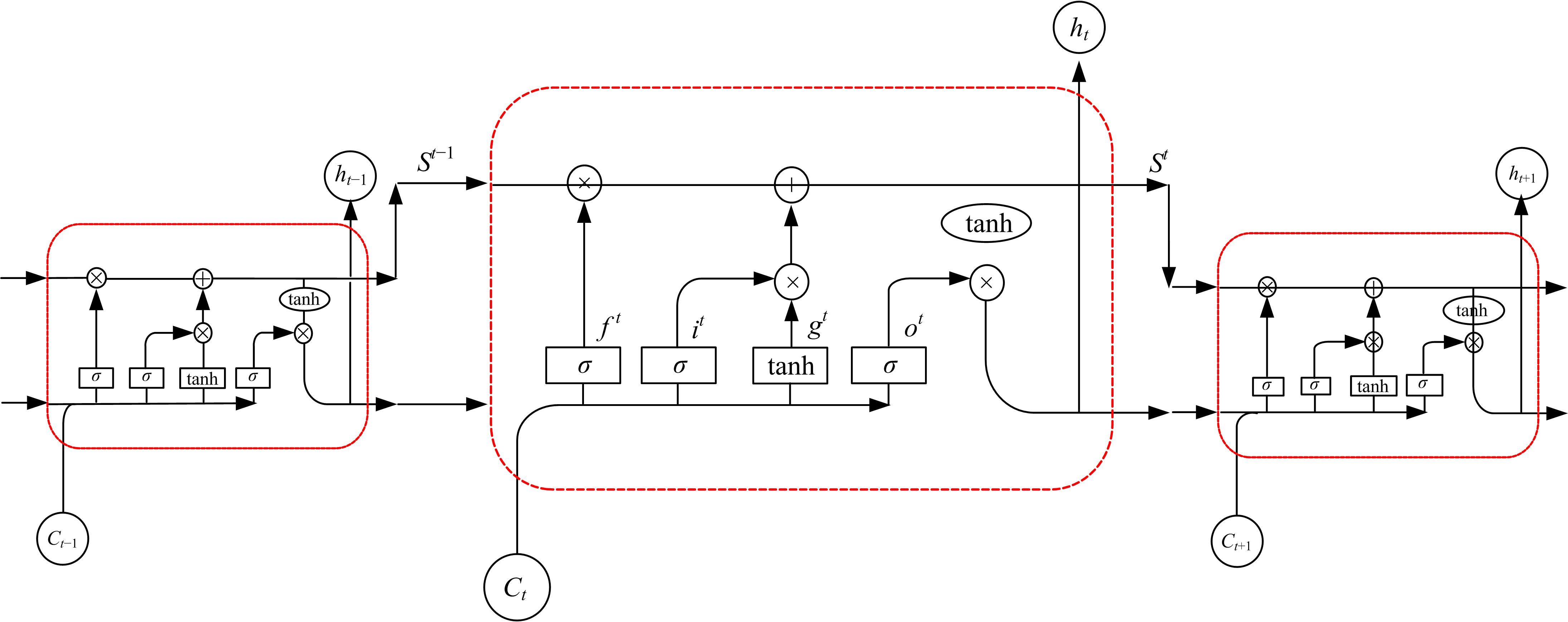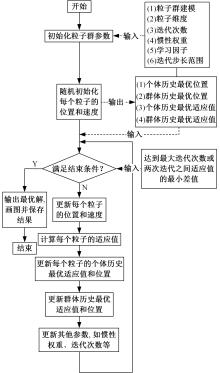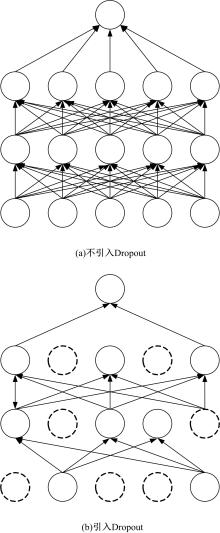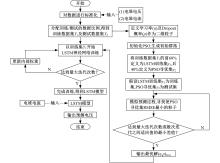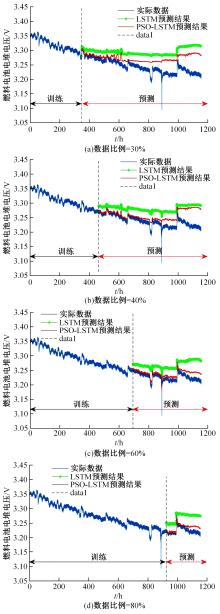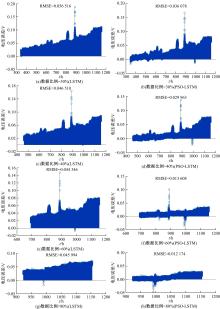Journal of Jilin University(Engineering and Technology Edition) ›› 2022, Vol. 52 ›› Issue (9): 2192-2202.doi: 10.13229/j.cnki.jdxbgxb20220419
Degradation trend prediction of proton exchange membrane fuel cell based on PSO⁃LSTM
Jin-wu GAO1,2( ),Zhi-huan JIA1,2,Xiang-yang WANG1,2,Hao XING3,4
),Zhi-huan JIA1,2,Xiang-yang WANG1,2,Hao XING3,4
- 1.State Key Laboratory of Automotive Simulation and Control,Jilin University,Changchun 130022,China
2.College of Communication Engineering,Jilin University,Changchun 130022,China
3.School of Automation,Hangzhou Dianzi University,Hangzhou 310018,China
4.Key Laboratory of Intelligent Control and Optimization for Industrial Equipment of Ministry of Education,Dalian University of Technology,Dalian 116024,China
CLC Number:
- TK91
| 1 | Liu D C, Lin R, Feng B, et al. Investigation of the effect of cathode stoichiometry of proton exchange membrane fuel cell using localized electrochemical impedance spectroscopy based on print circuit board[J]. International Journal of Hydrogen Energy, 2019, 44(14): 7564-7573. |
| 2 | Silva R E, Gouriveau R, Jemei S, et al. Proton exchange membrane fuel cell degradation prediction based on adaptive neuro-fuzzy inference systems[J]. International Journal of Hydrogen Energy, 2014, 39(21): 11128-11144. |
| 3 | Yuan H, Dai H, Wei X, et al. Model-based observers for internal states estimation and control of proton exchange membrane fuel cell system: a review[J]. Journal of Power Sources, 2020, 468: No. 228376. |
| 4 | Chen H C, Xu S C, Pei P C, et al. Mechanism analysis of starvation in PEMFC based on external characteristics[J]. International Journal of Hydrogen Energy, 2019, 44(11): 5437-5446. |
| 5 | Zhong D, Lin R, Jiang Z, et al. Low temperature durability and consistency analysis of proton exchange membrane fuel cell stack based on comprehensive characterizations[J]. Applied Energy, 2020, 264: No. 114626. |
| 6 | Lin R, Che L, Shen D, et al. High durability of Pt-Ni-Ir/C ternary catalyst of PEMFC by stepwise reduction synthesis[J]. Electrochimica Acta, 2020, 330: No. 135251. |
| 7 | 王哲,谢怡,臧鹏飞,等. 基于极小值原理的燃料电池客车能量管理策略[J]. 吉林大学学报: 工学版, 2020, 50(1): 36-43. |
| Wang Zhe, Xie Yi, Zang Peng-fei, et al. Energy management strategy of fuel cell bus based on Pontryagin's minimum principle[J]. Journal of Jilin University(Engineering and Technology Edition), 2020, 50(1): 36-43. | |
| 8 | Lin R H, Xi X N, Wang P N, et al. Review on hydrogen fuel cell condition monitoring and prediction methods[J]. International Journal of Hydrogen Energy, 2019, 44(11): 5488-5498. |
| 9 | Keller R, Ding S X, Müller M, et al. Fault-tolerant model predictive control of a direct methanol-fuel cell system with actuator faults[J]. Control Engineering Practice, 2017, 66: 99-115. |
| 10 | Tang W, Lin R, Weng Y, et al. The effects of operating temperature on current density distribution and impedance spectroscopy by segmented fuel cell[J]. International Journal of Hydrogen Energy, 2013, 38(25): 10985-10991. |
| 11 | Gouriveau R, Hilairet M, Hissel D, et al. IEEE PHM 2014 data challenge[EB/OL]. [2022-03-02]. |
| 12 | Pukrushpan J T. Modeling and Control of fuel cell systems and fuel processors[D]. Ann Arbor, Michigan:University of Michigan, 2003. |
| 13 | Zhang X, Pisu P. Prognostic-oriented fuel cell catalyst aging modeling and its application to health-monitoring and prognostics of a PEM fuel cell[J]. International Journal of Prognostics and Health Management, 2020, 5(1): 2153-2648. |
| 14 | Hu Zun-yan, Xu Liang-fei, Li Jian-qiu, et al. A reconstructed fuel cell life-prediction model for a fuel cell hybrid city bus[J]. Energy Conversion and Management, 2018, 156: 723-732. |
| 15 | Lu L G, Ouyang M G, Huang H Y, et al. A semi-empirical voltage degradation model for a low-pressure proton exchange membrane fuel cell stack under bus city driving cycles[J]. Journal of Power Sources, 2007, 164(1): 306-314. |
| 16 | Jouin M, Gouriveau R, Hissel D, et al. Degradations analysis and aging modeling for health assessment and prognostics of PEMFC[J]. Reliability Engineering & System Safety, 2016, 148: 78-95. |
| 17 | Javed K, Gouriveau R, Zerhouni N, et al. Prognostics of proton exchange membrane fuel cells stack using an ensemble of constraints based connectionist networks[J]. Journal Power Sources, 2016, 324: 745-757. |
| 18 | Silva R E, Gouriveau R, Jemei S, et al. Proton exchange membrane fuel cell degradation prediction based on adaptive Neuro-Fuzzy inference systems[J]. International Journal of Hydrogen Energy, 2014, 39(21): 11128-11144. |
| 19 | Morando S, Jemei S, Hissel D, et al. Proton exchange membrane fuel cell ageing forecasting algorithm based on echo state network[J].International Journal of Hydrogen Energy, 2017, 42(2): 1472-1480. |
| 20 | Wu Y M, Breaz E, Gao F, et al. Nonlinear performance degradation prediction of proton exchange membrane fuel cells using relevance vector machine[J]. IEEE Trans Energy Convers, 2016, 31(4): 1570-1582. |
| 21 | Ma R, Yang T, Breaz E, et al. Data-driven proton exchange membrane fuel cell degradation predication through deep learning method[J]. Applied Energy, 2018, 231: 102-115. |
| 22 | Pan R, Yang D, Wang Y J, et al. Performance degradation prediction of proton exchange membrane fuel cell using a hybrid prognostic approach[J]. International Journal of Hydrogen Energy, 2020, 45(55): 30994-31008. |
| 23 | Liu H, Chen J, Hou M, et al. Data-based short-term prognostics for proton exchange membrane fuel cells[J]. International Journal of Hydrogen Energy, 2017, 42(32): 20791-20808. |
| 24 | Zhou D, Gao F, Breaz E, et al. Degradation prediction of PEM fuel cell using a moving window based hybrid prognostic approach[J]. Energy, 2017, 138: 1175-1186. |
| 25 | Zuo B, Cheng J S, Zhang Z H. Degradation prediction model for proton exchange membrane fuel cells based on long short-term memory neural network and Savitzky-Golay filter[J]. International Journal of Hydrogen Energy, 2021, 46(29): 15928-15937. |
| 26 | Dong S J, Luo T H. Bearing degradation process prediction based on the PCA and optimized LS-SVM model[J]. Measurement: Journal of the International Measurement Confederation, 2013, 46(9): 3143-3152. |
| 27 | Chen J, Jing H, Chang Y, et al. Gated recurrent unit based recurrent neural network for remaining useful life prediction of nonlinear deterioration process[J]. Reliability Engineering & System Safety, 2019, 185: 372-382. |
| 28 | Mao L, Jackson L, Davies B. Effectiveness of a novel sensor selection algorithm in PEM fuel cell on-line diagnosis[J]. IEEE Transactions on Industrial Electronics (1982), 2018, 65(9): 7301-7310. |
| 29 | Pei P C, Chen D F, Wu Z Y, et al. Nonlinear methods for evaluating and online predicting the lifetime of fuel cells[J]. Applied Energy, 2019, 254: No. 113730. |
| 30 | Revankar S T, Majumdar P. Fuel cells: Principles, Design, and Analysis[M]. Boca Raton:CRC Press, 2014. |
| 31 | Huang S Y, Ganesan P, Jung H, et al. Development of supported bifunctional oxygen electrocatalysts and corrosion-resistant gas diffusion layer for unitized regenerative fuel cell applications[J]. Journal of Power Sources, 2012, 198: 23-29. |
| 32 | Xing L, Hossain M A, Tian M, et al. Platinum electro-dissolution in acidic media upon potential cycling[J]. Electrocatalysis-US, 2014, 5(1): 96-112. |
| 33 | Zhang S S, Yuan X Z, Hin J N C, et al. A review of platinum-based catalyst layer degradation in proton exchange membrane fuel cells[J]. Journal of Power Sources, 194(2): 588-600. |
| 34 | Ma R, Yang T, Breaz E, et al. Data-driven proton exchange membrane fuel cell degradation predication through deep learning method[J]. Applied Energy, 2018, 231: 102-115. |
| 35 | Curtin D E, Lousenberg R D, Henry T J, et al. Advanced materials for improved PEMFC performance and life[J]. Journal of Power Sources, 2004, 131(1/2): 41-48. |
| 36 | Yuan Xiao-zi, Li Hui, Zhang Sheng-sheng, et al. A review of polymer electrolyte membrane fuel cell durability test protocols[J]. Journal of Power Sources, 2011, 196(22): 9107-9116. |
| 37 | Srivastava N, Hinton G, Krizhevsky A, et al. Dropout: a simple way to prevent neural networks from overfitting[J]. The Journal of Machine Learning Research, 2014, 15(1): 1929-1958. |
| 38 | van den Bergh F, Engelbrecht A P. A study of particle swarm optimization particle trajectories[J]. Information Sciences, 2006, 176(8): 937-971. |
| 39 | 张慧斌, 王鸿斌, 胡志军. PSO 算法全局收敛性分析[J]. 计算机工程与应用, 2011, 47(34): 61-63. |
| Zhang Hui-bin, Wang Hong-bin, Hu Zhi-jun. Analysis of particle swarm optimization algorithm global convergence method[J]. Computer Engineering and Applications, 2011, 47(34): 61-63. | |
| 40 | Kingma D P, Ba L J. Adam: a method for stochastic optimization[C]∥International Conference on Learning Representations,San Diego,California,USA 2015: No.13. |
| [1] | Ji-zong LIU,Xiao-ping WU,Wei-hua KONG. Parameter configuration of fuel cell hybrid system for tram based on fish swarm optimization algorithm [J]. Journal of Jilin University(Engineering and Technology Edition), 2022, 52(9): 2004-2013. |
| [2] | Qi-ming CAO,Hai-tao MIN,Wei-yi SUN,Yuan-bin YU,Jun-yu JIANG. Hydrothermal characteristics of proton exchange membrane fuel cell start⁃up at low temperature [J]. Journal of Jilin University(Engineering and Technology Edition), 2022, 52(9): 2139-2146. |
| [3] | Zi-rong YANG,Yan LI,Xue-feng JI,Fang LIU,Dong HAO. Sensitivity analysis of operating parameters for proton exchange membrane fuel cells [J]. Journal of Jilin University(Engineering and Technology Edition), 2022, 52(9): 1971-1981. |
| [4] | Yun-feng HU,Tong YU,Hui-ce YANG,Yao SUN. Optimal control method of fuel cell start⁃up in low temperature environment [J]. Journal of Jilin University(Engineering and Technology Edition), 2022, 52(9): 2034-2043. |
| [5] | Jing DU,Hong-hui ZHAO,Yu-peng WANG,Tian-wei DING,Kai WEI,Kai WANG,Ling-hai HAN. Purge strategy optimization and verification of PEM fuel cell engine based on AMESim simulation model [J]. Journal of Jilin University(Engineering and Technology Edition), 2022, 52(9): 2069-2076. |
| [6] | Chong ZHANG,Yun-feng HU,Xun GONG,Yao SUN. Design of model⁃free adaptive sliding mode controller for cathode flow of fuel cell [J]. Journal of Jilin University(Engineering and Technology Edition), 2022, 52(9): 2085-2095. |
| [7] | Hai-lin KUI,Ze-zhao WANG,Jia-zhen ZHANG,Yang LIU. Transmission ratio and energy management strategy of fuel cell vehicle based on AVL⁃Cruise [J]. Journal of Jilin University(Engineering and Technology Edition), 2022, 52(9): 2119-2129. |
| [8] | Yang XIAO,Jie WANG,Meng-jun LIU,Fa-qing YANG,Tian-yao ZHANG,Wei LAN. Improved mechanical model of gas diffusion layer in proton exchange membrane fuel cell [J]. Journal of Jilin University(Engineering and Technology Edition), 2022, 52(9): 2147-2155. |
| [9] | Yan LIU,Tian-wei DING,Yu-peng WANG,Jing DU,Hong-hui ZHAO. Thermal management strategy of fuel cell engine based on adaptive control strategy [J]. Journal of Jilin University(Engineering and Technology Edition), 2022, 52(9): 2168-2174. |
| [10] | Pei ZHANG,Zhi-wei WANG,Chang-qing DU,Fu-wu YAN,Chi-hua LU. Oxygen excess ratio control method of proton exchange membrane fuel cell air system for vehicle [J]. Journal of Jilin University(Engineering and Technology Edition), 2022, 52(9): 1996-2003. |
| [11] | Jin-wu GAO,Yi-lin WANG,Hua-yang LIU,Yi-da WANG. Decoupling control for proton exchange membrane fuel cell air supply system based on sliding mode observer [J]. Journal of Jilin University(Engineering and Technology Edition), 2022, 52(9): 2156-2167. |
| [12] | Feng-xiang CHEN,Jun-yu ZHANG,Feng-lai PEI,Ming-tao HOU,Qi-peng LI,Pei-qing LI,Yang-yang WANG,Wei-dong ZHANG. Modeling and selection scheme of proton exchange membrane fuel cell hydrogen supply system [J]. Journal of Jilin University(Engineering and Technology Edition), 2022, 52(9): 1982-1995. |
| [13] | Zhen-ning LIU,Ke JIANG,Tao-tao ZHAO,Wen-xuan FAN,Guo-long LU. Development and experimental of high⁃power proton exchange membrane fuel cell test system [J]. Journal of Jilin University(Engineering and Technology Edition), 2022, 52(9): 2025-2033. |
| [14] | Xun-cheng CHI,Zhong-jun HOU,Wei WEI,Zeng-gang XIA,Lin-lin ZHUANG,Rong GUO. Review of model⁃based anode gas concentration estimation techniques of proton exchange membrane fuel cell system [J]. Journal of Jilin University(Engineering and Technology Edition), 2022, 52(9): 1957-1970. |
| [15] | Yao-wang PEI,Feng-xiang CHEN,Zhe HU,Shuang ZHAI,Feng-lai PEI,Wei-dong ZHANG,Jie-ran JIAO. Temperature control of proton exchange membrane fuel cell thermal management system based on adaptive LQR control [J]. Journal of Jilin University(Engineering and Technology Edition), 2022, 52(9): 2014-2024. |
|
||

